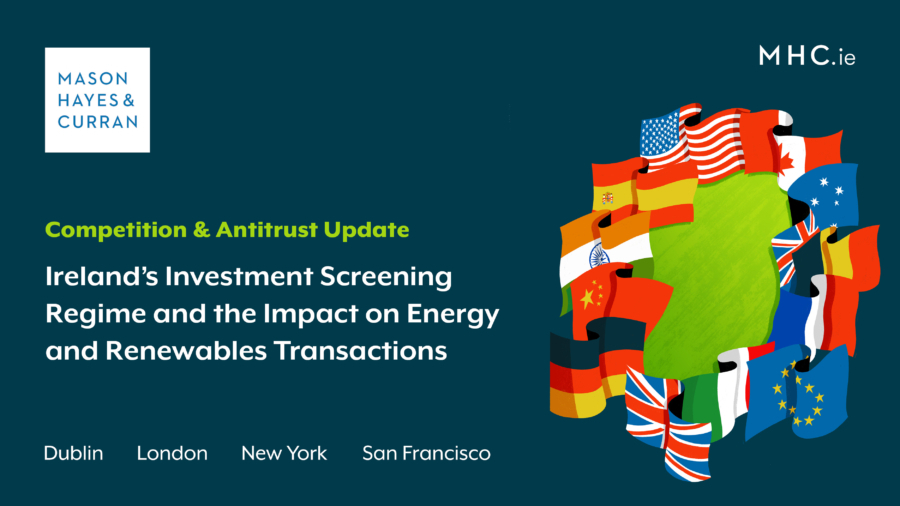Ireland’s Investment Screening Regime
The Impact on Energy and Renewables Transactions

Our Competition & Antitrust team considers the scope of Ireland’s first foreign investment screening regime, which is expected to be implemented in Q2 2024. They also set out why energy sector stakeholders need to be cognisant of how the regime will apply to energy and renewables transactions.
The Screening of Third Country Transactions Act 2023 (the FDI Act) is due to commence shortly. The FDI Act gives the Minister for Enterprise, Trade and Employment the power to review certain acquisitions by foreign investors that relate to, or impact on, a number of broad categories of sensitive and strategic sectors or activities, including the energy sector.
Parties to a transaction meeting the relevant criteria set out in the FDI Act must notify and obtain approval from the Minister prior to completing the transaction. Failure to do so is a criminal offence, punishable by fines. Therefore, in the case of energy transactions involving foreign acquirers, careful consideration is required of whether the deal is subject to the new regime. Helpfully, the Minister has published detailed draft ‘Inward Investment Screening Guidance’ (the Draft Guidance), which clarifies several elements of the FDI Act.
Key features of the new regime and how they could apply to energy or renewables transactions
Similar to the existing Irish merger control rules, the FDI Act creates a mandatory and suspensory notification regime for transactions meeting four cumulative criteria. A transaction will be notifiable where all of the following apply:
1. A “third-country undertaking” (a country outside the EU/EEA and Switzerland), or a person connected with such an undertaking:
- Acquires control of an asset or an undertaking in the State, or
- Changes the percentage of shares or voting rights it holds in an undertaking in the State:
- From 25% or less to more than 25%, or
- From 50% or less to more than 50%
2. The cumulative value of the transaction and any related transactions in a period of 12 months prior to the date of the transaction is at least €2 million.
As expected, the Draft Guidance states that this threshold relates to the entire value of the consideration being paid by the acquirer. In other words, the threshold is linked to the total purchase price paid by the acquirer, including any international dimension such as assets or undertakings not located in the State acquired as part of the transaction.
3. The same undertaking does not, directly or indirectly, control all the parties to the transaction.
4. The transaction relates to, or impacts on, one or more of the following matters referred to in the EU Screening Regulation:
- Critical infrastructure, whether physical or virtual, including energy, transport, water, health, communications, media, data processing or storage, aerospace, defence, electoral or financial infrastructure, and sensitive facilities, as well as land and real estate crucial for the use of such infrastructure
- Critical technologies and dual use items, including artificial intelligence, robotics, semiconductors, cybersecurity, aerospace, defence, energy storage, quantum and nuclear technologies as well as nanotechnologies and biotechnologies
- Supply of critical inputs, including energy or raw materials, as well as food security
- Access to sensitive information, including personal data, or the ability to control such information, or
- The freedom and pluralism of the media.
Energy assets and services may fall within the definition of “critical infrastructure”, “critical technologies and dual use items” and/or “critical inputs”. Therefore, transactions in the energy sector involving a change of control of any energy asset or undertaking in the State and meeting criteria 1-3 (inclusive) above will likely require notification to, and clearance by, the Minister before the transaction can close. This could include, for example, the acquisition of all or part of an asset or an entity in the State whose activities relate to, or impact on, the production, distribution, supply, storage, operation or transmission of electricity, oil, gas, hydrogen or other renewables.
The Draft Guidance also provides a welcome confirmation that an Irish nexus requirement applies, that is, the target must operate the “critical” element of its business, or the critical infrastructure must be located, in Ireland.
The FDI Act captures not only outright acquisitions, but also minority investments and joint ventures. Examples of the types of energy transactions that could fall within the scope of the FDI Act include where a “third country undertaking" or a person connected with such an undertaking:
- Directly or indirectly acquires control of energy or renewable energy assets in the State or undertakings owning, controlling or having the right to operate or use such assets.
- Directly or indirectly, eg through a joint venture, acquires a shareholding or voting rights greater than 25% in an undertaking in the State with activities in or relating to the energy sector. However, the Draft Guidance confirms that the creation of a new JV without any transfer of assets would not be caught.
- Makes a greenfield investment involving the purchase of land where the land may be crucial for critical infrastructure in energy (or certain other) sectors.
For further information on the multi-party obligation to notify the Minister, the potential impact to deal timelines, the consequences for failure to comply with the new regime and more, please see our previous insight here.
Comment
Ireland’s foreign investment review process needs to be factored into transactions for the sale or purchase of, or investments in, energy and renewables assets or undertakings in Ireland involving acquirers from “third countries”. A mandatory notification has the potential to impact significantly on deal timelines as split signing and completion will generally be required. Therefore, specific condition precedents to closing will need to be incorporated into the transaction documentation and timelines to completion and longstop dates will need to be mapped accordingly.
As implementation of the FDI Act is expected to occur in Q2 2024, investors should start thinking now about key questions such as:
- Does the transaction meet the criteria for a mandatory notification?
- Should the deal documentation provide for a potential notification?
- What impact would a notification have on the deal timeline?
- What remedies could be offered to address any public order and/or security concerns?
- Is there a risk, if the transaction is closed or non-notifiable, that it would be called-in for review by the Minister?
For more information and expert advice on the impact of the new regime on any anticipated transaction in the energy and renewables space, contact a member of our Energy or Competition & Antitrust teams.
The content of this article is provided for information purposes only and does not constitute legal or other advice.
Share this:




